

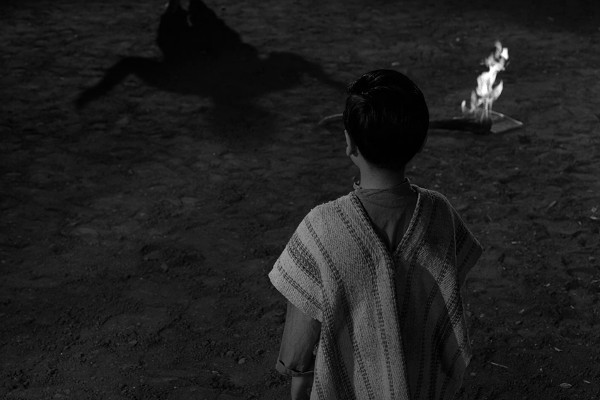
A story of a town of Mexicans featuring only one actor of Mexican descent, this is unfortunately quite a patronising depiction of the race. Rod Serling did much to increase understanding with this scripts, but by placing a proto-Maple Street layer of paranoia across a Mexican village, he casts the people as superstitious and lacking in modern sophistication.
There's also the matter of the acting. While The Twilight Zone generally has a very stylised, pre-Method approach to acting, many of the performances are of a very high standard. Sadly, this isn't quite the case here, with some especially poor thesping by the series' usual standards. The story is not without some small merits, although it does feel laboured, and the Shakespearian quoting at the end does feel trite, and almost habitual for Rod at this stage. While it's maybe not a gift you'd give back, you'd certainly ask for the receipt to see if you could exchange it for something better.
Speaking of Serling, then this episode sees his most shocking advertisement for cigarettes yet. Having now abandoned season two's favourite nicotine of Oasis, Rod can be seen puffing on Chesterfields through a dozen introductions and seventeen "next time..." outros. Worse still, seven of these outros included an overt speech about the joy of Chesterfields, during one of which he even shamefully brings his children into events: "As one of my kids says, there's a trillion trillion ways of telling a story... but there's really only one way to tell the Chesterfield story..." This particular instalment sees Rod praising the blends of the brand before, as pictured in the large image at the top of this page, he is shamelessly shut off by two curtain rows of the smokes.
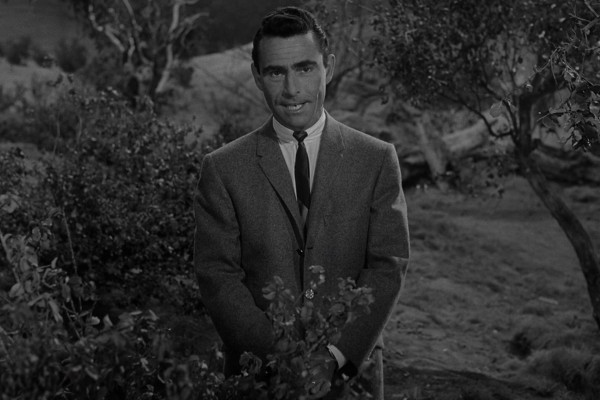
A cheap episode starts badly as two Civil War soldiers on a sound stage attempt to spy "Yankees" on a blown up still photograph. This cheapness extends towards Rod, who gets one of his most unfortunate introductions... standing behind a bush with his hands clasped at his crotch, as if he was forced to relieve himself just before the cameras started rolling. Thankfully, things pick up slightly as the soldier finds a battalion of "Yankees" frozen. While intriguing, it does unfortunately bring to mind season one's Elegy, complete with slightly swaying "frozen" soldiers.
Based on a story by Manly Wade Wellman, it does feel as if Rod Serling's script hasn't been fully fleshed out and is perhaps rushed. The opening neatly sets up a younger soldier as a coward, but - other than him urging the use of black magic to defeat the opposing army - this ultimately comes to nothing.
Even the black magic motif seems half-hearted, and a little out of place in the running... the following week's episode was The Jungle, which features yet more of the stuff. In the end effect, despite being a regular-length episode, it feels more like an 80s revival story in that it doesn't really have a traditional three-act structure of any real note, and feels more like a two-act experiment.
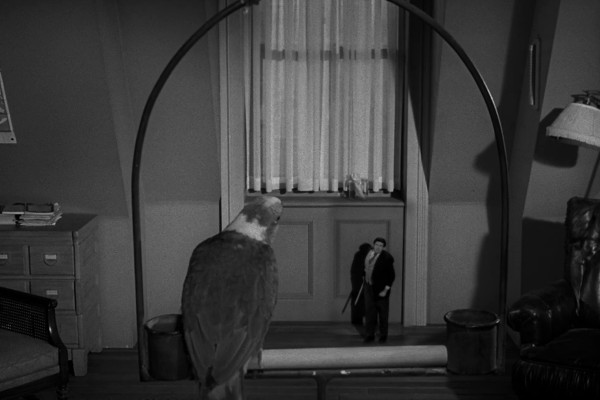
One of the very oddest episodes, as Serling writes a script based on a 1959 Price Day story about a man who wants to shrink all the evil people in the world. With the lead character one of Serling's wild eccentrics with milk bottle glasses and a name like "Oliver Crangle", this could be taken as one of his broad "comedy" episodes - complete with a parrot that shouts out "nut!" at ironically opportune moments. However, while Theodore Bikel plays the part very much "full on", he also plays it for real, after a fashion, and all the supporting characters are straight. The ending is truly curious, an old-fashioned body horror "freak" ending, more dark Laurel and Hardy than The Twilight Zone, but one still quite affecting. As Rod himself put it in the previous episode's "next time" trailer, "this one is told very far out, but considering the nature of the times, it happens to be very close in."
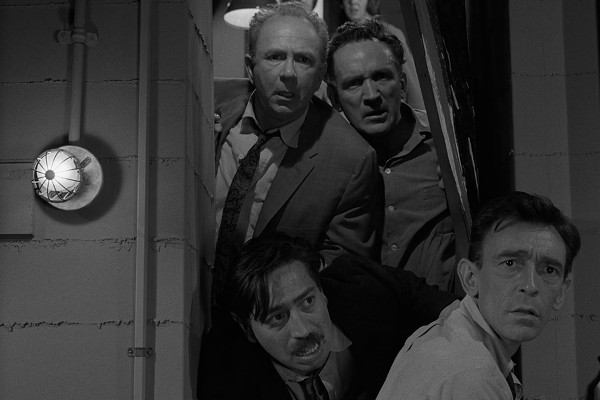
Very much "Maple Street Redux", as a group of neighbours turn on each other under the threat of nuclear war. As this is season three, then the situations are perhaps even harder than before - one neighbour is racially abused, and punched in the face - but it lacks the former's originality. There's also the small matter of it containing no real supernatural or SF elements, which, while fine enough, means that it could fit in almost any anthology series, and isn't intrinsically a Twilight Zone. Ultimately, it's perhaps an episode which time has passed by: when it was broadcast in 1961 it was incredibly topical and different, whereas since that time the themes have become so universal they have been tackled in sitcoms from Happy Days to Rude Health and The Young Ones.
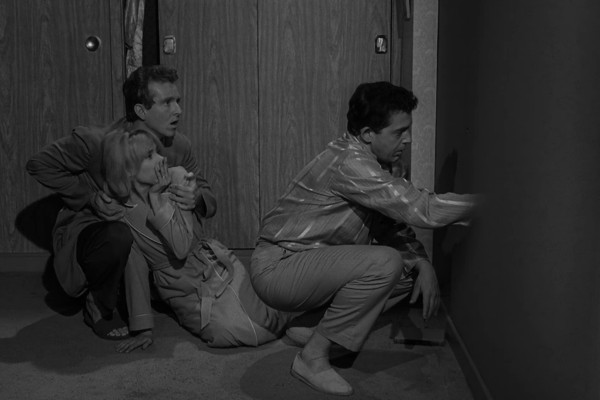
Richard Matheson delivers a script based on one of his own short stories from 1953. This one is special because it introduces concepts of physics that weren't common on television of the time. Delivering the science-based exposition is Charles Aidman, who went on to narrate the first two seasons of the 1980s revival series. Aidman effectively carries the episode, delivering some gravitas while the parents of a girl who goes missing through a time portal are somewhat wet and ineffectual. And while a great initial concept, there's perhaps not enough mileage in a one-note idea to extend to a full episode without padding.
While one of the oddest episodes, what really sinks its quality and causes it to rank so low down in this list is the voice actress playing the missing girl. The girl, Tracy Stratford, gets to say her own lines in the fifth season episode Living Doll, and even gets to say four "mommies" in this one... but for the rest of the duration, her off-screen lines are performed by 31-year-old Rhoda Williams. Williams performed voices from everything from Brigitte Bardot to nine-year-old French boys and Disney cartoons. However, there is absolutely no point in this episode where the "voice" of six-year-old Tina doesn't sound exactly like what it is... a grown woman in her thirties.
This is also a particularly bad episode for Serling fans, as, while the camera makes pains to pan up his legs and make the most of his introduction, he can be seen glancing off-camera for his opening cue.
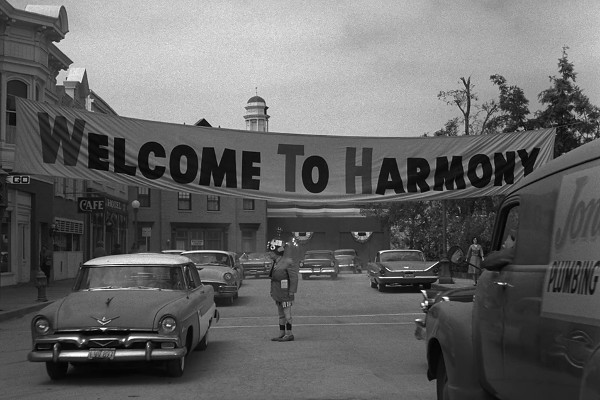
A truly unique episode of The Twilight Zone that pays homage to Buster Keaton. The actor had long been out of the limelight and would sadly die just over four years after this episode aired, but it's a wonderful tribute. Sure, the screenplay lacks inherent wit in places - as the opening is done via intertitle cards, wouldn't it have been wittier to have Rod Serling's introduction silent as well? - but it gets by. And, while it lacks the invention that Keaton's films often displayed, having the Twilight Zone theme rendered as a silent movie score at the end is reasonably inspired.
Ultimately the episode perhaps relies on whether or not the viewer is a fan of silent comedy... an art form of which The Anorak Zone is a great admirer. There is a tendency to play down to a basic conception of the form rather than acknowledge there's more to silent comedy than slapstick, but it is nice to see Keaton making a form of comeback, even if his best work rarely featured him in just his pants (underwear to any American readers) holding a chicken. As Chaplin, Lloyd and Laurel were all still alive while this episode was being made, it could be considered a great shame that they didn't attempt more with the format... though if the genre isn't your thing, you might be glad they stopped at this one.